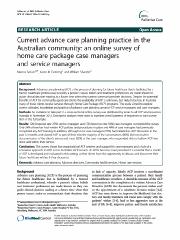Please use this identifier to cite or link to this item:
https://ahro.austin.org.au/austinjspui/handle/1/12758Full metadata record
| DC Field | Value | Language |
|---|---|---|
| dc.contributor.author | Sellars, Marcus | en |
| dc.contributor.author | Detering, Karen M | en |
| dc.contributor.author | Silvester, William | en |
| dc.date.accessioned | 2015-05-16T02:29:45Z | |
| dc.date.available | 2015-05-16T02:29:45Z | |
| dc.date.issued | 2015-04-23 | en |
| dc.identifier.citation | Bmc Palliative Care 2015; 14(): 15 | en |
| dc.identifier.govdoc | 25903912 | en |
| dc.identifier.other | PUBMED | en |
| dc.identifier.uri | https://ahro.austin.org.au/austinjspui/handle/1/12758 | en |
| dc.description.abstract | Advance care planning (ACP) is the process of planning for future healthcare that is facilitated by a trained healthcare professional, whereby a person's values, beliefs and treatment preferences are made known to guide clinical decision-making at a future time when they cannot communicate their decisions. Despite the potential benefits of ACP for community aged care clients the availability of ACP is unknown, but likely to be low. In Australia many of these clients receive services through Home Care Package (HCP) programs. This study aimed to explore current attitudes, knowledge and practice of advance care planning among HCP service managers and case managers.An invitation to take part in a cross-sectional online survey was distributed by email to all HCP services across Australia in November 2012. Descriptive analyses were used to examine overall patterns of responses to each survey item in the full sample.120 (response rate 25%) service managers and 178 (response rate 18%) case managers completed the survey. Only 34% of services had written ACP policies and procedures in place and 48% of case managers had previously completed any ACP training. In addition, although most case managers (70%) had initiated an ACP discussion in the past 12 months and viewed ACP as part of their role, the majority of the conversations (80%) did not result in documentation of the client's wishes and most (85%) of the case managers who responded did not believe ACP was done well within their service.This survey shows low organisational ACP systems and support for case managers and a lack of a normative approach to ACP across Australian HCP services. As HCPs become more prevalent it is essential that a model of ACP is developed and evaluated in this setting, so that clients have the opportunity to discuss and document their future healthcare wishes if they choose to. | en |
| dc.language.iso | en | en |
| dc.title | Current advance care planning practice in the Australian community: an online survey of home care package case managers and service managers. | en |
| dc.type | Journal Article | en |
| dc.identifier.journaltitle | BMC palliative care | en |
| dc.identifier.affiliation | Respecting Patient Choices, Austin Health, Melbourne, Australia | en |
| dc.identifier.doi | 10.1186/s12904-015-0018-y | en |
| dc.description.pages | 15 | en |
| dc.relation.url | https://pubmed.ncbi.nlm.nih.gov/25903912 | en |
| dc.type.austin | Journal Article | en |
| local.name.researcher | Detering, Karen M | |
| item.grantfulltext | open | - |
| item.openairetype | Journal Article | - |
| item.languageiso639-1 | en | - |
| item.fulltext | With Fulltext | - |
| item.openairecristype | http://purl.org/coar/resource_type/c_18cf | - |
| item.cerifentitytype | Publications | - |
| crisitem.author.dept | Advance Care Planning | - |
| crisitem.author.dept | Advance Care Planning | - |
| Appears in Collections: | Journal articles | |
Files in This Item:
| File | Description | Size | Format | |
|---|---|---|---|---|
| 25903912.pdf | 286.97 kB | Adobe PDF |  View/Open |
Page view(s)
68
checked on Nov 19, 2024
Download(s)
110
checked on Nov 19, 2024
Google ScholarTM
Check
Items in AHRO are protected by copyright, with all rights reserved, unless otherwise indicated.
